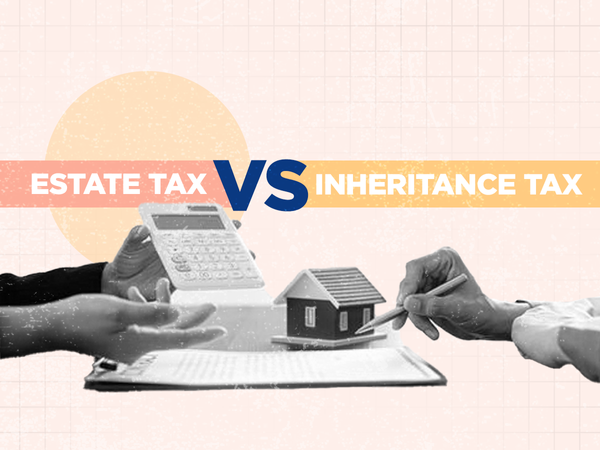If you're here because you got confused about the difference between estate tax and inheritance tax—we hear you!
There are instances when estate tax and inheritance tax (which mean two different things), are interchanged and used in the same context as synonyms.
While both estate tax and inheritance tax are related to the same cause, i.e., the transfer of wealth and assets to heirs, it's important to note that they’re not the same. Since these taxes can be of great concern for people who want to pass on their assets to their family, friends, or those inheriting the wealth, understanding the implications of estate tax vs. inheritance tax is crucial for future planning.
In this article, we will delve into understanding these two types of taxes to know what they are, how they differ from each other, and what you should know to make informed decisions about your property.
What is an inheritance tax?
An inheritance tax is a tax imposed on the beneficiary who inherits the money, property, or assets of a deceased person. The tax rate differs for each beneficiary inheriting different types of estate, properties, and assets. The relationship between the deceased and the beneficiary is also assessed to determine the tax rate.
For example, close family members, such as spouses and children, may face lower tax rates or even full exemptions, while distant relatives or family friends may be subjected to higher tax rates.
There is no standard tax rate for every state in the US either, with only a few states currently imposing them. It is also important to note that the inheritance tax exists only at the state level. The federal government doesn't impose them.
How is estate tax different from inheritance tax?
To understand the key difference between estate tax and inheritance tax, you need to understand who is liable to pay the tax in both cases.
In the case of estate tax, the tax is levied on the deceased person's wealth and assets before they are transferred to the heirs. You might wonder who has to bear the liability of this tax, as that's what most people need clarification on. The person responsible for paying the estate tax out of the estate's funds is the person responsible for filing an estate tax return.
The estate tax is calculated on the total value of the deceased person's estate, including everything from real estate investments to cash.
On the other hand, inheritance tax, as the name suggests, is paid by the person receiving the estate and assets, i.e., the one inheriting it. If there is more than one beneficiary, they are all supposed to pay their own inheritance tax, based on the tax rates that apply to them.
Unlike inheritance tax, the federal government imposes an estate tax, but only some US states have provisions for their own estate tax.
Another difference between estate tax vs. inheritance tax is that estate tax is based on the property value of the estate, unlike inheritance tax, where the tax rate is determined based on the relationship between the deceased person and the beneficiary.
Regarding estate tax, the higher the estate value, the higher the tax rate.
Does Texas have an inheritance tax?
No, the state of Texas is one of the few states in the US that doesn't impose an inheritance tax. Having said that, Texas does have an estate tax for estates valued over $11.7 million for individuals and $23.4 million or more for married couples as of 2023.
It is also important to remember that tax laws change or evolve over time, and the state or federal government may have new policies rolling in, so it's best to stay updated with the latest information.
What happens to the property and the property tax when the homeowner passes away?
The process of transferring the estate begins when the homeowner passes away. However, until the estate is fully settled and distributed to the heirs, the property remains a part of the homeowner's estate. That said, the property tax obligations do not cease to exist during the process of transferring the estate, which involves the estate or its executor, who pays the tax.
The property tax is assessed by the local government authorities or counties, and the property tax bill can then be transferred to the new owners of the property, i.e., the heirs.
The local tax authority continues to send the tax bill to the property's address, which the inheritor must pay. Therefore, it is essential for heirs to be aware of these property tax obligations in order to avoid getting into trouble if they don't pay on time.
If the heir or the beneficiary chooses to sell the property as soon as it’s received and is not interested in retaining ownership, the outstanding property tax obligations will be settled during the sales process. In this case, the new owners, whether individuals or institutions, are responsible for future property tax bill payments.
The estate tax vs. inheritance tax debate isn't always a straightforward matter and involves many complexities that an average Texas or US resident may not get easily.
To summarize, estate tax is imposed on a deceased person's estate and is paid by the person responsible for filling the transfer of estate, usually by using the estate's funds. On the other hand, inheritance tax is levied on those beneficiaries who inherit the estate and assets of the deceased person.
Saying all of that, when in doubt, it's still best to seek guidance from a qualified tax professional or an estate planning attorney to determine the unique implications of your situation. This will also help you ensure the estate and assets are transferred or received smoothly.
Similarly, if you're looking for assistance with protesting your property tax bill in Texas, Bezit can help you file a successful protest and save thousands of dollars, just as we've helped 500+ Texas homeowners do already. Get to know more about us here.

